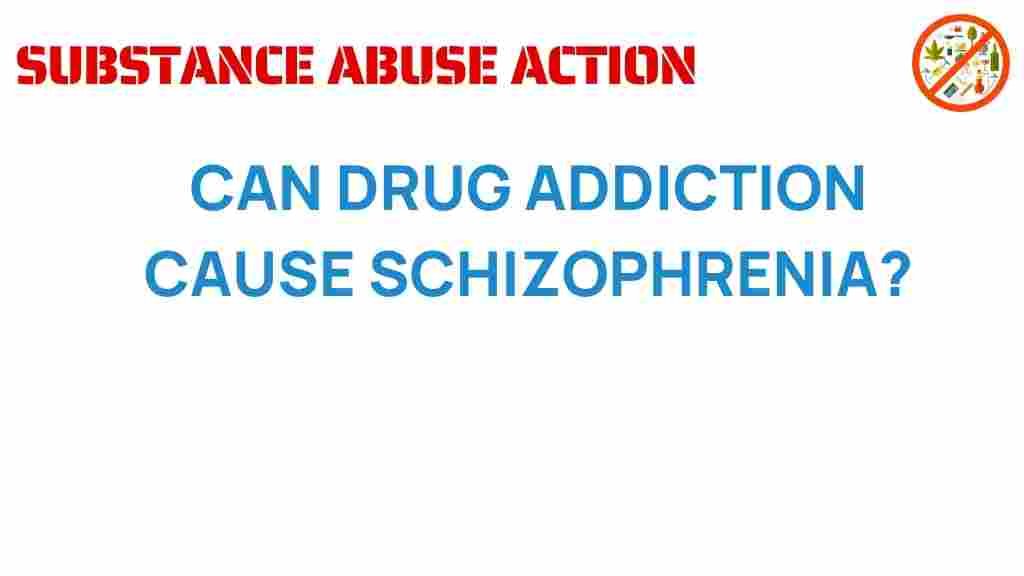Unraveling the Link Between Drug Addiction and Schizophrenia
Drug addiction and schizophrenia are two significant issues that affect millions of people worldwide. Understanding the intricate relationship between these two conditions is essential for effective mental health treatment and prevention strategies. This article will delve into the connection between drug addiction and schizophrenia, exploring the impact of substance abuse on psychological disorders and discussing treatment options, recovery, and support.
Understanding Drug Addiction and Schizophrenia
Drug addiction, often referred to as substance use disorder, is a chronic condition characterized by an uncontrollable urge to consume drugs despite the harmful consequences. It can lead to severe physical, emotional, and social problems.
On the other hand, schizophrenia is a serious mental health disorder that affects how a person thinks, feels, and behaves. Individuals with schizophrenia may experience delusions, hallucinations, disorganized thinking, and other symptoms that can severely impair their functioning.
The Connection Between Drug Addiction and Schizophrenia
Research indicates a significant overlap between drug addiction and schizophrenia. Here are some ways they are connected:
- Common Risk Factors: Both conditions share common risk factors, including genetic predisposition, environmental influences, and early life trauma.
- Substance Use and Symptoms: Individuals with schizophrenia may turn to drugs to cope with their symptoms, leading to substance abuse.
- Worsening Mental Health: Drug addiction can exacerbate the symptoms of schizophrenia, making treatment more challenging.
Impact of Substance Abuse on Mental Health
Substance abuse can have devastating effects on mental health, particularly for individuals with underlying psychological disorders like schizophrenia. The impact of drug addiction on mental health includes:
- Increased Severity of Symptoms: Substance abuse can intensify the symptoms of schizophrenia, leading to more severe episodes of psychosis.
- Complicated Treatment: Treating schizophrenia becomes more complex when a patient is also struggling with drug addiction, often requiring integrated treatment approaches.
- Social and Economic Consequences: Individuals may face job loss, relationship breakdowns, and increased healthcare costs due to the dual diagnosis of schizophrenia and drug addiction.
Treatment Options for Co-occurring Disorders
Addressing both drug addiction and schizophrenia requires a comprehensive treatment approach. Here are some effective treatment options:
- Integrated Treatment Programs: These programs are designed to treat both mental health and substance use disorders simultaneously, providing a coordinated approach to care.
- Medication: Antipsychotic medications can help manage schizophrenia symptoms, while medications for substance use disorders can aid in recovery from drug addiction.
- Therapy: Cognitive-behavioral therapy (CBT) is effective for both schizophrenia and addiction, helping individuals develop coping strategies and change negative thought patterns.
Prevention Strategies for Drug Addiction and Schizophrenia
Preventing drug addiction, especially in individuals at risk for schizophrenia, is crucial. Here are some effective prevention strategies:
- Education and Awareness: Increasing awareness about the risks of substance abuse and its impact on mental health can help individuals make informed choices.
- Early Intervention: Identifying and addressing mental health issues early can reduce the risk of developing substance use disorders.
- Support Systems: Building strong support networks through family, friends, and community resources can provide essential help for individuals at risk.
Recovery and Support for Individuals
Recovery from drug addiction and managing schizophrenia is a lifelong journey that requires ongoing support. Here are some key elements of recovery:
- Support Groups: Joining support groups such as Narcotics Anonymous (NA) or organizations specifically for those with schizophrenia can provide encouragement and understanding.
- Therapeutic Relationships: Establishing a trusting relationship with mental health professionals is vital for effective treatment and recovery.
- Healthy Lifestyle Choices: Engaging in regular exercise, maintaining a balanced diet, and practicing mindfulness can significantly enhance overall well-being.
Troubleshooting Common Challenges in Treatment
Individuals facing drug addiction and schizophrenia may encounter various challenges during treatment. Here are some common issues and troubleshooting tips:
- Non-compliance with Medication: Some individuals may struggle with medication adherence. It’s crucial to communicate openly with healthcare providers about any side effects or concerns.
- Relapse: Relapse is common in recovery. Developing a relapse prevention plan and utilizing support systems can help individuals manage triggers and cravings.
- Co-occurring Disorders: It’s essential to ensure that both conditions are treated simultaneously. Integrated treatment facilities can provide the necessary resources and support.
Conclusion
The link between drug addiction and schizophrenia presents significant challenges for individuals and mental health professionals. Understanding this relationship is crucial for developing effective treatment options and prevention strategies. By addressing both drug addiction and schizophrenia through integrated care, support systems, and healthy lifestyle choices, individuals can work towards recovery and improve their mental health.
If you or someone you know is struggling with drug addiction or schizophrenia, seeking professional help is the first step towards recovery. For more information on support and treatment options, visit NAMI, the National Alliance on Mental Illness.
Additionally, learn more about mental health resources and support through this link.
This article is in the category Addiction and created by SubstanceAbuseAction Team
